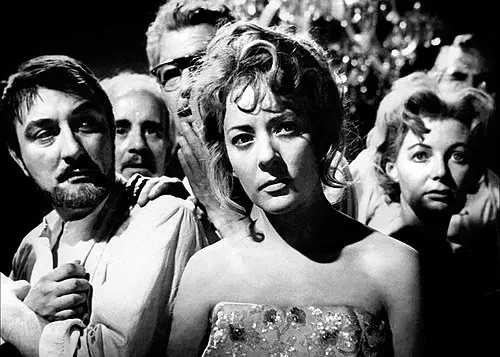The Exterminating Angel: Buñuel’s Surreal Allegory of Aristocratic Decay

July 22, 2025 Hour: 2:21 pm
In 1962, Spanish-born director Luis Buñuel unveiled The Exterminating Angel, a surrealist drama that would go on to become one of the most enduring allegories of class disintegration and social absurdity in cinematic history. Filmed in Mexico and starring Silvia Pinal, the film thrusts viewers into a world where social rituals unravel, exposing the primal instincts lurking beneath elite decorum.
The premise is deceptively simple: a group of affluent guests arrives at a luxurious mansion for an evening of fine dining and idle conversation. Yet, as the evening draws to a close, the guests discover that they cannot — or will not — leave the room.
There are no physical barriers, yet something intangible paralyzes them. Days pass, and as hunger sets in and civility erodes, the bourgeois ensemble descends into emotional chaos, superstition, and animalistic behavior.
Buñuel’s camera, renowned for its unflinching surrealism, captures both the opulence of the setting and its gradual degradation.
Ritual and repetition play crucial roles: unexplained loops of dialogue, recurring gestures, and bizarre coincidences contribute to a dreamlike claustrophobia.
Critics interpret the film as a damning portrayal of the upper class’s spiritual and moral bankruptcy, suggesting that civilization itself may be little more than a fragile performance.
Upon its release, The Exterminating Angel was heralded as a provocative triumph, earning the FIPRESCI Prize at the 1962 Cannes Film Festival. Though banned for a time in Francoist Spain, its global influence endured. In 2016, it was reimagined as an opera by Thomas Adès, premiered at the Salzburg Festival, reinforcing the film’s cross-generational resonance.
The film blends elements of absurdist theater, recalling Sartre’s No Exit, with the ideological sharpness of Buñuel’s previous works such as Viridiana. Religious symbolism, particularly Catholic motifs of sacrifice and ritual, permeates the story, underscoring Buñuel’s enduring skepticism of institutional morality.
Silvia Pinal’s performance stands at the heart of the film’s psychological gravity. Her character, Leticia “La Valkiria,” emerges as both observer and catalyst, her transformation mirroring the group’s collective descent from order into chaos.
Though set in a confined space, the film’s impact reaches far beyond its walls. For modern viewers, The Exterminating Angel resonates as a metaphor for cycles of denial, privilege, and collective paralysis — themes that remain pressing in today’s global landscape.
Cinematographer Gabriel Figueroa lends stark visual contrast to the film’s surreal tone. Shadows stretch and encroach, and the once-glittering salon becomes a prison of fading prestige.
In 2023, The Exterminating Angel was featured in a retrospective at the Museum of Modern Art, reaffirming its place in The New York Times’ list of 1000 greatest films.
Today, over six decades after its release, Buñuel’s vision continues to challenge viewers to look beyond social conventions and confront the fragility of civility.
Author: OSG






